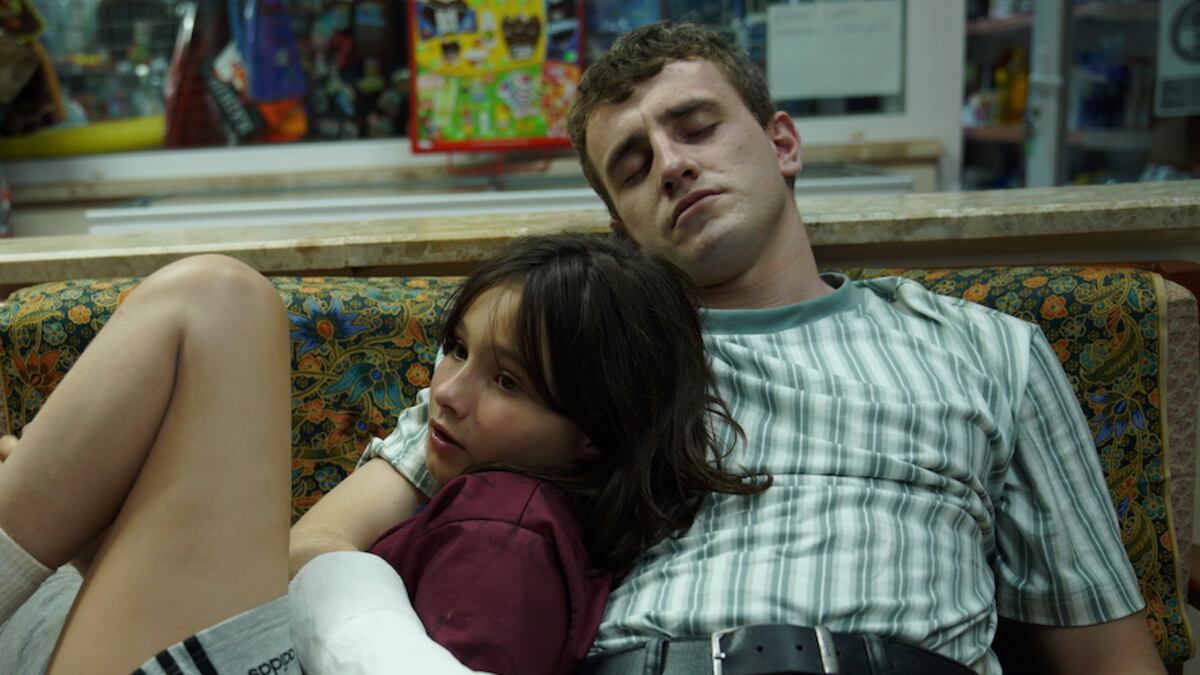AFTERSUN
**** There’s no such thing as a cool dad, confesses Aftersun through oblique heartbreak—even if that dad shoots doubles pool with his daughter and is played by Paul Mescal (the budding heartthrob of Normal People and Phoebe Bridgers-dating fame). As another character in the film does, you might mistake Calum (Mescal) and 11-year-old Sophie (Frankie Corio) as age-distant siblings when you first see them on their budget-resort vacation in Turkey. She’s calm and self-possessed for her age; he’s chaperoning very loosely for his. First-time director Charlotte Wells memorializes the singular, unreal and entirely fleeting feeling of a vacation bond shared with one’s irregular guardian (Calum lives separately from Sophie and her mother), and Aftersun’s constant use of camcorder footage as a looking glass for the characters is no innocent nostalgia document. Calum keeps checking the tape as if evaluating whether they’re having a good time, and Gregory Oke’s elliptical cinematography pays off when we understand that what we’re witnessing is not so much a golden or stolen father-daughter moment. It’s that crossroads where an immature parent and a mature child meet in the middle all too briefly. R. CHANCE SOLEM-PFEIFER. Living Room.
BARDO, FALSE CHRONICLE OF A HANDFUL OF TRUTHS
**** Silverio Gama (Daniel Giménez Cacho) clambers atop a mountain of corpses and faces Hernán Cortés, the Spanish conquistador who decimated the Aztec empire. Then, someone calls, “Cut!” Turns out we’re on a set where Silverio, a filmmaker and journalist, is creating a work of docufiction. Is he a visionary artfully confronting evil? Or a pretentious egomaniac using genocide as a vessel for his genius? You might wonder the same thing about Bardo’s director, Alejandro G. Iñárritu, whose devotion to extreme filmmaking (from the ultra-long takes in Birdman to the snow-and-blood brutality of The Revenant) has earned him a reputation as a brilliant showboat. Still, haters and adherents alike should agree that Bardo puts on an intoxicating show. With its wild flourishes of fantasy, tragedy, absurdity and sex, it is, blessedly, a movie that can barely be contained by the big screen. Silverio may wonder whether fame has leached the authenticity out of his activism, but Iñárritu never gets his feet stuck in existential mud. Like Cacho in the film’s ecstatic opening shot in the desert, he leaps and soars, carrying us through both the mortal world and the afterlife. Death always looms, but Bardo has air in its lungs and blood pumping through its heart, especially in the tender moments Silverio shares with his family. Just watch as he chats with his daughter Camila (Ximena Lamadrid) in a swimming pool whose light blue waters seem to extend to eternity. It’s a scene at once ordinary and wondrous, conveying the film’s defining belief: Dreams are the stuff of life and life is the stuff of dreams. R. BENNETT CAMPBELL FERGUSON. Hollywood.
THE MENU
**** A horror comedy with a nuanced social commentary emerges as often as a snowball freezes in hell, but when Satan sees Mark Mylod’s The Menu, he’ll have to don a fur coat. The film stars Anya Taylor-Joy as Margot, who’s not the type to frequent an extravagant and highly exclusive restaurant that serves tiny-portioned abstract concepts as courses. Nonetheless, she happily obliges her date, Tyler (Nicholas Hoult), and his nonstop musings about the culinary arts. As the couple joins the other diners on a small yacht heading toward a restaurant on a remote island in the Pacific Northwest, the chaotic plotlines woven throughout the story ignite. In short, The Menu skillfully subjects White Lotus-type characters to a Willy Wonka-style comeuppance. Ralph Fiennes, as Chef Slowik, is the most spellbinding psychopath since Anthony Hopkins’ Hannibal Lecter; composer Colin Stetson’s eerily dissonant instrumentals (reminiscent of his Hereditary score) punctuate each cleverly constructed scare; and writers Seth Reiss and Will Tracy unleash a gripping argument about the consumption of art in the age of content. Mix these ingredients together and they equal a movie that will devour your attention from start to finish. R. ALEX BARR. Bridgeport, Cedar Hills, Cinema 21, Clackamas, Division, Fox Tower, Lake Theater, Laurelhurst, Living Room, Lloyd Center, Oak Grove, Pioneer Place, Studio One, Tigard.
SALVATORE: SHOEMAKER OF DREAMS
*** Hollywood’s golden age spawned many tales of ordinary people fighting to get a foot in the door—and an Italian immigrant who put a shoe on it once they’d arrived. Salvatore: Shoemaker of Dreams is a documentary by director Luca Guadagnino (Call Me by Your Name, Suspiria) about Salvatore Ferragamo, Tinseltown’s most famous maestro of footwear. Narrated by Michael Stuhlbarg and colored with classic reels, old photographs, and high-profile interviews (Martin Scorsese makes an appearance), the film poignantly depicts Ferragamo’s immigration to America in 1915. Arriving as a poor teenage shoemaker, he was eventually discovered by a small town called Hollywood and made shoes legendary for their comfort, yet stylish enough to be worn by America’s first celebrities (“I have found there are no bad feet. There are bad shoes,” he would say). Guadagnino remains hyperfocused on Ferragamo’s passion for feet, only tangentially touching on his experiences during major world events like the Great Depression and World War II during a tedious third act. Still, the film shines while showing his early immigrant story, and there’s an infectious Forrest Gump-type joy to this tale of a simple man rubbing elbows with fame and history—and how a platonic foot fetish and exceptional skill made him Salvatore Ferragamo, “Shoemaker to the Stars.” PG. RAY GILL JR. Living Room.

